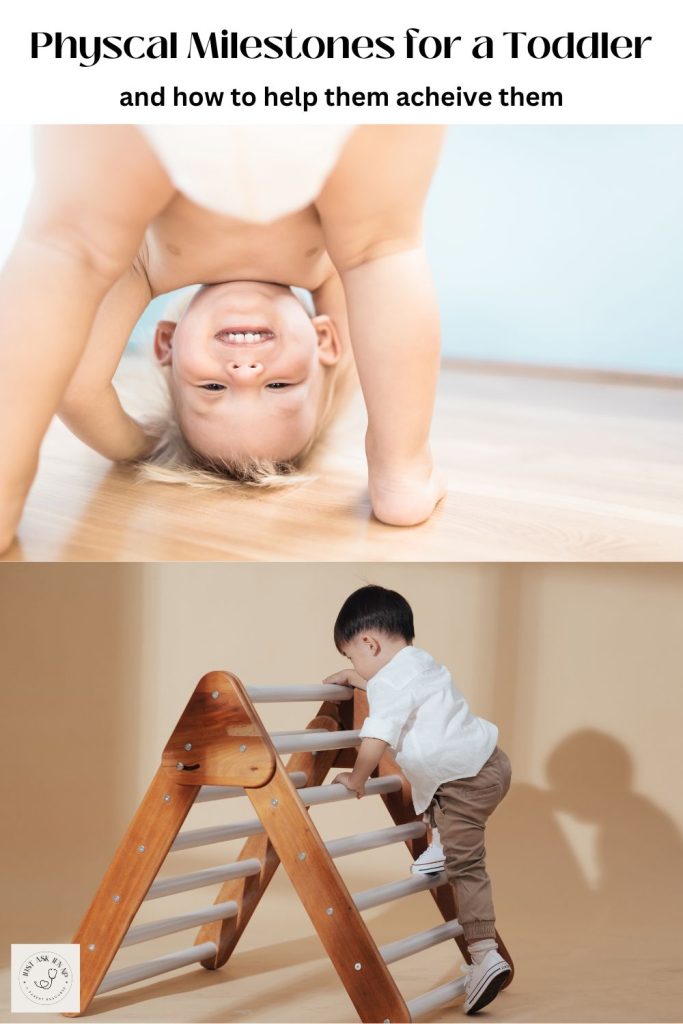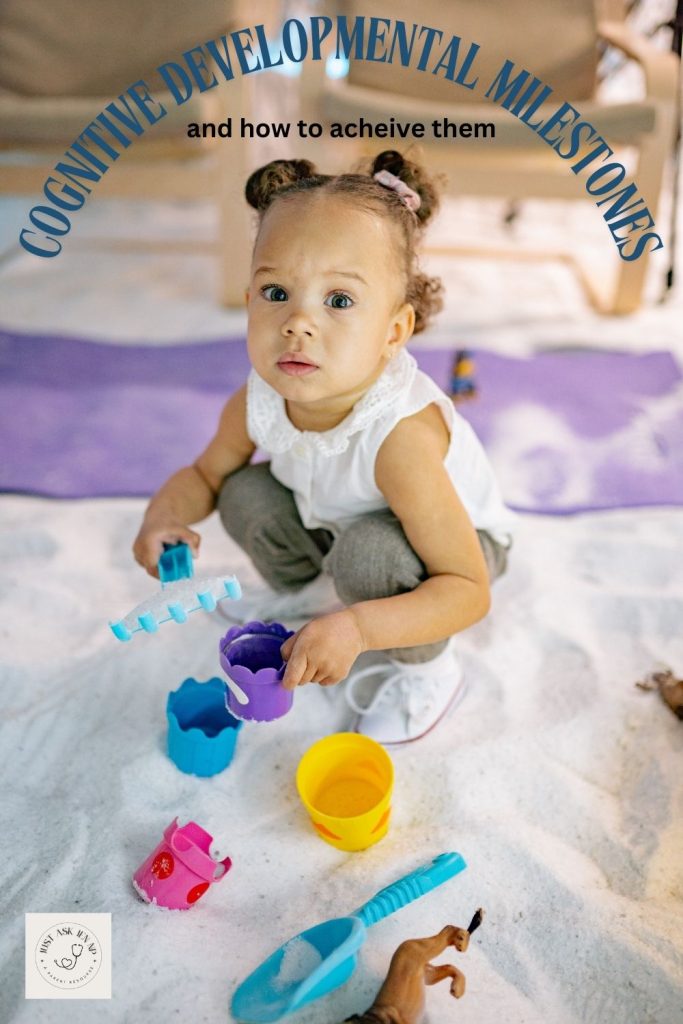Toddler Developmental Milestones to Watch for & Games to Achieve Them
Watching your toddler grow and learn new skills is an exciting journey. Every child develops at their own pace, but there are key toddler developmental milestones that most toddlers reach around specific ages. These milestones help parents and caregivers track a child’s progress in different areas, including physical, cognitive, language, and social-emotional skills.
Scroll down for game ideas to help in each area. As a parent and nurse, I have learned that games are usually a better way to achieve a goal as opposed to “homework” with assigned tasks. So, have fun and enjoy your little one!
1. Physical Toddler Developmental Milestones

Toddlers undergo rapid physical development as they gain strength, coordination, and mobility. Here’s what to expect:
- 12-18 months: Walking independently, attempting to climb stairs, using a pincer grasp to pick up small objects.
- 18-24 months: Running, kicking a ball, beginning to climb furniture, holding a crayon and scribbling.
- 2-3 years: Jumping with both feet, walking up and down stairs with assistance, building a tower of blocks, beginning to use utensils while eating.
When to Be Concerned: If your child is not walking by 18 months or showing signs of difficulty with movement, discuss this with a healthcare provider.
2. Cognitive Toddler Developmental Milestones

Cognitive development refers to a child’s ability to think, learn, and solve problems.
- 12-18 months: Understanding object permanence (knowing things exist even when out of sight), imitating simple actions, showing curiosity about surroundings.
- 18-24 months: Following simple instructions, recognizing familiar objects and pictures, starting to engage in pretend play.
- 2-3 years: Sorting objects by shape and color, solving simple puzzles, demonstrating memory of familiar routines.
When to Be Concerned: If your child is not responding to their name, struggling to understand simple instructions, or showing little interest in exploring their environment, consult a specialist.
3. Language Toddler Developmental Milestones

Language development is an essential part of a toddler’s growth. While each child develops speech at a different rate, these general milestones are helpful indicators:
- 12-18 months: Saying a few words like “mama” or “dada,” understanding simple commands.
- 18-24 months: Using 10-50 words, combining two words into phrases (e.g., “more milk”), pointing to objects when named.
- 2-3 years: Speaking in short sentences, using 200+ words, asking simple questions.
When to Be Concerned: If your child is not using any words by 18 months or not attempting two-word phrases by age 2, it may be helpful to seek speech therapy evaluation.
4. Social and Emotional Toddler Developmental Milestones

Social and emotional skills help toddlers build relationships and express their feelings.
- 12-18 months: Showing affection to familiar people, experiencing separation anxiety, engaging in simple games like peek-a-boo.
- 18-24 months: Displaying independence (e.g., insisting on doing things themselves), imitating actions of caregivers.
- 2-3 years: Expressing emotions verbally, playing alongside other children (parallel play), beginning to share and take turns.
When to Be Concerned: If your child avoids eye contact, does not engage in social interactions, or shows extreme difficulty handling changes, it may be helpful to consult a pediatrician.
Games and Activities to Support Toddler Development
Engaging your toddler in play-based learning is one of the best ways to support their development. Play helps refine motor skills, enhance language development, encourage problem-solving, and foster social-emotional growth. Here are some key activities, categorized by the skills they support:
1. Fine Motor Skills & Hand-Eye Coordination
Fine motor skills involve small muscle movements, which are essential for tasks like writing, buttoning clothes, and using utensils.
🖍️ Activity: Finger Painting & Crayon Scribbling
- Why It’s Important: Strengthens finger muscles and improves grip, essential for later writing skills.
- How to Play: Let your toddler explore different colors and textures with paint, crayons, or chalk. Encourage them to draw simple shapes.
🎲 Activity: Stacking Blocks & Nesting Cups
- Why It’s Important: Enhances hand-eye coordination and problem-solving skills.
- How to Play: Challenge them to build the tallest tower possible or sort cups by size.
2. Gross Motor Skills & Coordination
Gross motor skills involve larger muscle groups, which are crucial for balance, coordination, and overall movement.
🏃 Activity: Obstacle Course
- Why It’s Important: Builds coordination, agility, and strength.
- How to Play: Use pillows, tunnels, and stepping stones to create a course where toddlers crawl, jump, and climb.
🎈 Activity: Balloon Toss
- Why It’s Important: Improves hand-eye coordination and encourages active play.
- How to Play: Blow up a balloon and encourage your child to keep it in the air using their hands, head, or even feet!
3. Speech & Language Development
Early language skills are critical for communication and future literacy.
📚 Activity: Story Time & Interactive Reading
- Why It’s Important: Expands vocabulary and comprehension.
- How to Play: Read books aloud and ask your toddler to point to pictures, name objects, or predict what happens next.
🎵 Activity: Singing Nursery Rhymes
- Why It’s Important: Helps with word recognition, memory, and rhythm.
- How to Play: Sing songs like Twinkle Twinkle Little Star or The Itsy Bitsy Spider, adding hand motions for extra engagement.
4. Social-Emotional Development & Problem-Solving
Toddlers learn about emotions, empathy, and teamwork through interaction.
🧸 Activity: Pretend Play (Dolls, Kitchen Sets, Doctor Kits)
- Why It’s Important: Develops social skills, creativity, and problem-solving abilities.
- How to Play: Encourage them to “cook” meals, take care of stuffed animals, or play “store” using toy cash registers.
🎭 Activity: Emotion Matching Game
- Why It’s Important: Helps toddlers recognize and express emotions.
- How to Play: Show pictures of different facial expressions and ask, “What do you think this person is feeling?” Then, mirror the expressions together.
5. Cognitive Development & Early Problem-Solving
Critical thinking skills begin in toddlerhood and can be encouraged through puzzles and logic-based play.
🧩 Activity: Simple Shape Sorters & Puzzles
- Why It’s Important: Enhances spatial awareness and problem-solving.
- How to Play: Offer puzzles with large pieces or shape-sorting toys where toddlers match shapes to corresponding holes.
🔦 Activity: Hide & Seek with Objects
- Why It’s Important: Encourages memory and spatial reasoning.
- How to Play: Hide a toy under one of three cups and let your toddler guess where it is.
Final Thoughts
Tracking toddler developmental milestones is a great way to ensure your child is growing and learning as expected. Remember, every child develops at their own pace, and small delays are not always a cause for concern. However, if you notice significant delays in multiple areas, early intervention can make a big difference. If you have concerns about your toddler’s development, don’t hesitate to reach out to a healthcare professional for guidance.
By staying informed and involved, you can help support your toddler’s growth and set them up for success in their early years.
For more guidance on milestones, check out the CDC website https://www.cdc.gov/ncbddd/actearly/milestones/index.html
For a list of 40 ideas to keep you toddler entertained, check out this post https://justaskjennp.com/toddler-activities-to-keep-busy/
